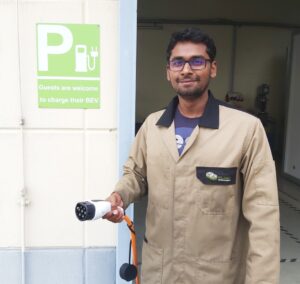

The efficient and appropriate use of transportation has significant environmental benefits. We therefore use trip logs in our fleet and give our employees a BahnCard when they take their first interregional trip for the company. The train, schedule permitting, thus becomes a cost-effective alternative and the travel time may be used productively.
If a business trip requires a vehicle, then the most economical vehicle sufficient for the task is chosen. This leads to the preferential use of the more cost-effective vehicles. In addition to environmentally friendly LPG technology, the fleet also includes a battery-driven electric vehicle. The heavy diesel vechiles are used only when truly necessary.
Part of the challenge of switching to battery-driven electric vehicles is establishing a robust charging network. We are proud to play our part in supporting the switch to cleaner transportation. Anyone who visits us is more than welcome to charge their vehicle using our outlet.

The use of trip logs encompasses not only business trips, but also private use of company vehicles. The law allows for either a flat rate, lump sum compensation of the associated pecuniary beenefts of such use or the billing of the real costs associated with the trips documented in the log. The lump sum method creates a false incentive, since additional trips do not cost the employee any more and they would be unlikely to consider the train as an alternative. Private use would then be more likely to encompass trips of unusual scale, such as a long-distance vacation with the family instead of the more normal case of a single person with a briefcase. Instead, our employees can either choose to use the appropriate vehicle for their private trips or forgo one in favor of the train, since their BahnCard may, of course, also be used for private trips.
During 2020 we updated all of our older test rigs to the newest technological standards. This includes the use of variable-speed drives for the auxiliary components such as coolers and pumps, something that has been included in our standard since 2015. Simultaneously, we optimized the piping which substantially reduces flow losses. The variable speed drives reduce the power needs of a dual-station test rig by up to 1,5 kW, leading to a savings of up to 1000 kWh/month during continuous use. Aside from these points, we generally emphasize efficiency when designing our machines, which is beneficial from both economic and environmental points of view.
Our company has an environmental management system in accordance with ISO 14001 which serves firstly to avoid waste and secondly to steer waste to an appropriate disposal method.
Whenever it is sensible from an organisational point of view, we encourage our employees to take advantage of the opportunity of working from home. This avoids unnecessary trips between home and the office which not only protects the environment, but also saves time and money.